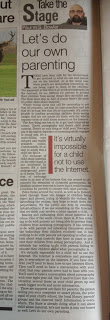My column in The Kerryman. 21 August, 2013
There have been calls for the Government to get involved in what we can and cannot see on the Internet. As is the usual case when people are demanding censorship, we are being urged to think of the children. The argument is that there’s so much pornography on the Internet, it’s too difficult for parents to protect their children from seeing things they shouldn’t see. The State must step in. And of course there’s the issue of online child abuse material.
What’s vexing about this call for censorship is not that it’s pointless, not that it’s crass populism and not that it’s so lazy, but that it’s so inaccurate. It’s unforgivable to confuse protecting children from seeing images that are not meant for them with the wholly separate issue of child abuse material on the Internet.
The first thing one has to do is get one’s terminology correct. There’s pornography and there’s child abuse material. There’s no such thing as ‘child porn.’ Pornography is the explicit depiction of consenting adults engaged in sexual acts. It’s a multi-billion euro industry and readily available online. Unfortunately it’s so easy to access that a child can find it.
The exchange of child abuse material is not motivated by money. It’s a dark underground activity of barter. This system of exchange exists in an area of the Internet that was created to circumvent the attentions of dictatorial governments. Its idealistic creators were not to know that it would become a medium for perverts to connect with other perverts.
Police forces around the world, as well as in Ireland, trawl through these vile images of children being raped and abused, trying to identify the victims. By identifying the victims, they hope to track down the perpetrators. We the public can help by emailing info@hotline.ie if we see something on the Internet, we think may involve a crime against a child.
Making and exchanging child abuse material is a crime. One of the worst crimes there is. It has nothing to do with parents not being able to prevent their children from accessing pornography. It has nothing to do with parents not educating themselves about the technology their children routinely use. It has nothing to do with parents not speaking to other parents about what controls they have in place to prevent their children from seeing pornography. And it certainly has nothing to do with parents failing to educate their children about what pornography is.
It’s virtually impossible for a child not to use the Internet. The Internet is everywhere and pornography is everywhere on the Internet. If you have children you’ll need to learn how to use Internet filters. Then you’ll need to have a conversation with your child, that your parents never had to have with you. You’ll need to have a conversation about pornography with your eight year old. You’ll need to have that conversation several times as your child grows up and needs bigger words and more information.
There are supports out there for parents; the person selling you your computer or smart phone, the principal of your child’s school, the local library, parents’s groups and the Internet itself. Information is everywhere. The State is already doing what it can about child abuse material, let’s not invite it into our homes as well. Let’s do our own parenting.




